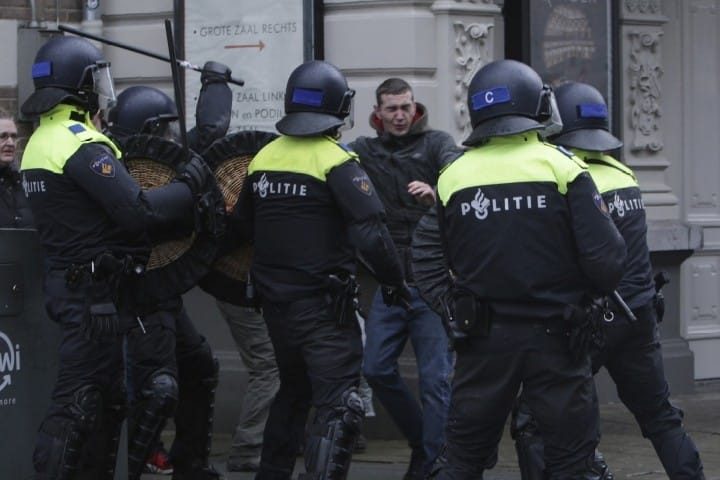
Amsterdam is known for many things, not least as a popular tourist destination. It is generally not known for controversy and protest. But that’s just what happened on January 17 when thousands of Dutch citizens took to the city streets to protest the destruction of their rights as a result of their nation’s COVID-19 lockdown.
Images from the protest show police in riot gear and on horseback confronting citizens demanding their rights. According to German newspaper Deutsche Welle, “The protesters gathered on Museumplein, a square in front of the Rijksmuseum and Van Gogh Museum art galleries.”
Calling the protest “unauthorized,” the German newspaper noted that many of the protestors were skeptics of the safety of the much-acclaimed COVID vaccines.
Many of the protestors “waved banners including ‘Covid vaccine = poison’ and showing opposition to [Dutch Prime Minister Mark] Rutte’s government and his coronavirus restrictions.”
According to the paper, approximately 2,000 people took part in the protest.
The Amsterdam-based news publication NL Times said that over 100 people were arrested at the protest.
“A total of 143 people were arrested during an illegal demonstration,” NL Times reported. “Fifteen of them are suspected of public violence and still in custody. The rest were charged with ignoring police orders and sent home, the Amsterdam police said on Twitter.”
Citing the Telegraaf newspaper, Deutsche Welle said police moved in to disperse protesters after “many refused to leave and threw fireworks and bricks.”
In addition to riot police on horseback, the paper reported, police used water canons to disperse the crowd.
Dutch lockdown restrictions put in place in mid-December forced primary and secondary schools to close, closed down daycare providers, forced the closure of “non-essential” stores — including garden centers — closed museums and other “public spaces,” and limited the number of people who may visit a person’s home to just two as long as they are over the age of 12. Other restrictions include the closure of gyms and swimming pools and limiting outdoor exercise to those engaged in activities either alone or in pairs — groups larger than two are not allowed.
The restrictions were due to expire on January 19 according to Dutch Review, but the Dutch government, despite strong public opposition, moved to extend the lockdown.
Dutch authorities, Deutsche Welle reported, “decided to keep stores and schools closed for another three weeks. Strict restrictions that were introduced in December could be tightened,” the paper warned, citing comments from virologist Menno de Jong.
“If the slight decline does not continue and, at the same time, the English mutation starts to take over, then we are even more likely to think about stricter measures,” de Jong told Amsterdam local television station Amstel Television 5 (AT5) according to Deutsche Welle.
De Jong’s comments were also reported by the NL Times. Elaborating further, de Jong, who is a professor of medical microbiology and infection control, warned that stricter measures might be needed.
“In view of all the challenges, we are certainly not against easing. Over the next one to two weeks, we have to see whether this slight decline will continue. If this does not continue and at the same time the English variant starts to take the upper hand, we are more likely to think about stricter measures,” de Jong said, according to the NL Times.
The Amsterdam protest comes at a time when political controversy has roiled the nation after authorities wrongfully accused Dutch parents of fraud over welfare payments. “Many wrongfully accused parents were plunged into debt when tax officials demanded repayment of payments,” the Associate Press reported.
As a result of the scandal, Prime Minister Rutte led his cabinet into resigning, saying “the buck stops here.” The resignations were welcomed by opposition leader Geert Wilders, who said, “Innocent people have been criminalized, their lives destroyed and parliament was informed about it inaccurately and incompletely.” Details of the scandal had been revealed in what the Associate Press labeled “a scathing parliamentary report” issued in December titled “Unprecedented Injustice.”
Like the never-ending coronavirus lockdown, the Rutte government remains in power in “caretaker mode,” AP reported, “until a new coalition is formed after a March 17 election.”



